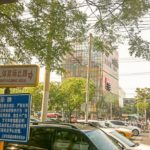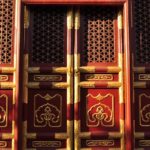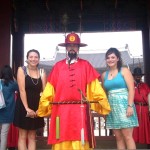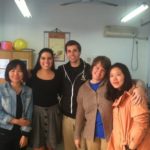Finding Comfort Zones in a Foreign City
“I go to seek a great perhaps” was the title of my cringe-worthy Facebook status. I was at Heathrow airport about to board a plane to China, where I’d be spending the next six months teaching English. I was crying, I couldn’t finish my (overpriced) Carluccios, and I had to remove items from my overweight suitcase.
Fast forward five months. I had completed my teaching term in Chengdu, Sichuan province, and I had one month to travel around China before flying home from Beijing. I visited Xi’an and Chongqing with friends, but then naturally, we all went our own ways. I went on to visit Guilin, Nanjing, Hangzhou, Shanghai, Qingdao, and Beijing alone.
Thinking back on it, Qingdao reflects the time when I was most seeking my great perhaps. When I arrived, by train, it was dark and rainy, so I was happy to find that my hostel just a short five minute walk away. I had the directions written down so I was comfortable in finding my own way there with my rucksack and two handbags. But the hostel was grimy, and the staff seemed more interested in chatting with the other guests and they didn’t understand what I was saying. My dorm was right next to the reception and the noisy guests were actually my roomies. Trying to tell myself this was all part of the experience, I fell asleep. It was still raining the next day, but I made the most of it. I visited Qingdao Beer Museum and then headed to a big shopping centre.
Not long after I returned back that evening, I heard a British couple walk into the room. I rolled away from the dirty wall, bounced up from the solid-bed, and introduced myself. They were called Paul and Hafsa, and had just finished teaching in Beijing. We instantly bonded over how much we didn’t like the hostel. Hafsa had already decided they would be moving out the next day. Although I felt a little embarrassed at first, I asked for the rest of my money back the next morning and we left the hostel early.
Despite ‘comfort zones’ and ‘adventure’ being mostly used in opposition with each other, there is a beauty in how harmonious they can be.
We’d located the next hostel to head to, and so we walked for an hour uphill in the sunshine, through the city, through the streets, past the markets, bus stops, shops, and restaurants. The Old Observatory Hostel was slightly more expensive but it boasted a hilltop view of the city and sea-view. I showed them the night markets I’d discovered, we visited a museum together, and Hafsa and I walked along the beach.
One night, we befriended an Austrlian called Daz who told the most interesting stories. On wooden stools, we sat in the outside section of a small corner restaurant, right in the middle of the street markets, had beer poured straight from the keg, watched lorries unload and reload with various crates of beer and seafood, and watched the masses of packaging carpet the streets.
Paul and Hafsa had to stay on in Qingdao because they were waiting for their passports to be renewed, but I had my train to Beijing to catch. On our last day together, Hafsa showed me a tiny shop in a basement, which served through the basement window on street level, a classic Chinese snack, something that was a bit like a pancake with delicious toppings. And I showed them a popular milkshake shop that served the best ice chocolate shakes I’d ever tasted.
We said our goodbyes at the hostel, and as I walked back downhill with my rucksack and two handbags, I passed the same shops we had passed on the walk up, smelt the same smells from the restaurants we had crossed, and also recognised little side streets that led to different areas that I definitely wouldn’t have recognised when we first made our journey up.
Finding Comfort Zones in a Foreign City.
What Paul and Hafsa showed me, was that we are constantly finding comfort zones. This is good for two reasons. Firstly, it shows that you can eventually find comfort in something that once terrified you: facing a phobia, settling into a new job, or regularly speaking in front of larger groups. Secondly, I believe that the more comfort zones you find, the more adventurous you become. Despite ‘comfort zones’ and ‘adventure’ being mostly used in opposition with each other, there is a beauty in how harmonious they can be.
I was terrified to go to China. But I explored so many comfort zones during my time there, and each one was different from the last: settling into my Chengdu flat, enjoying the bus route from the city to my district, viewing spicy Sichuan hotpot as a ‘classic’ meal, knowing how to pass the time when I boarded a long train, eating at restaurants alone and making small talk with families. It showed that I could find comfort zones in things that had once seemed so alien.
I never managed to find Paul and Hafsa online, so wherever they are, and whatever they are doing now, I would like to thank them for helping me seek my great perhaps.








